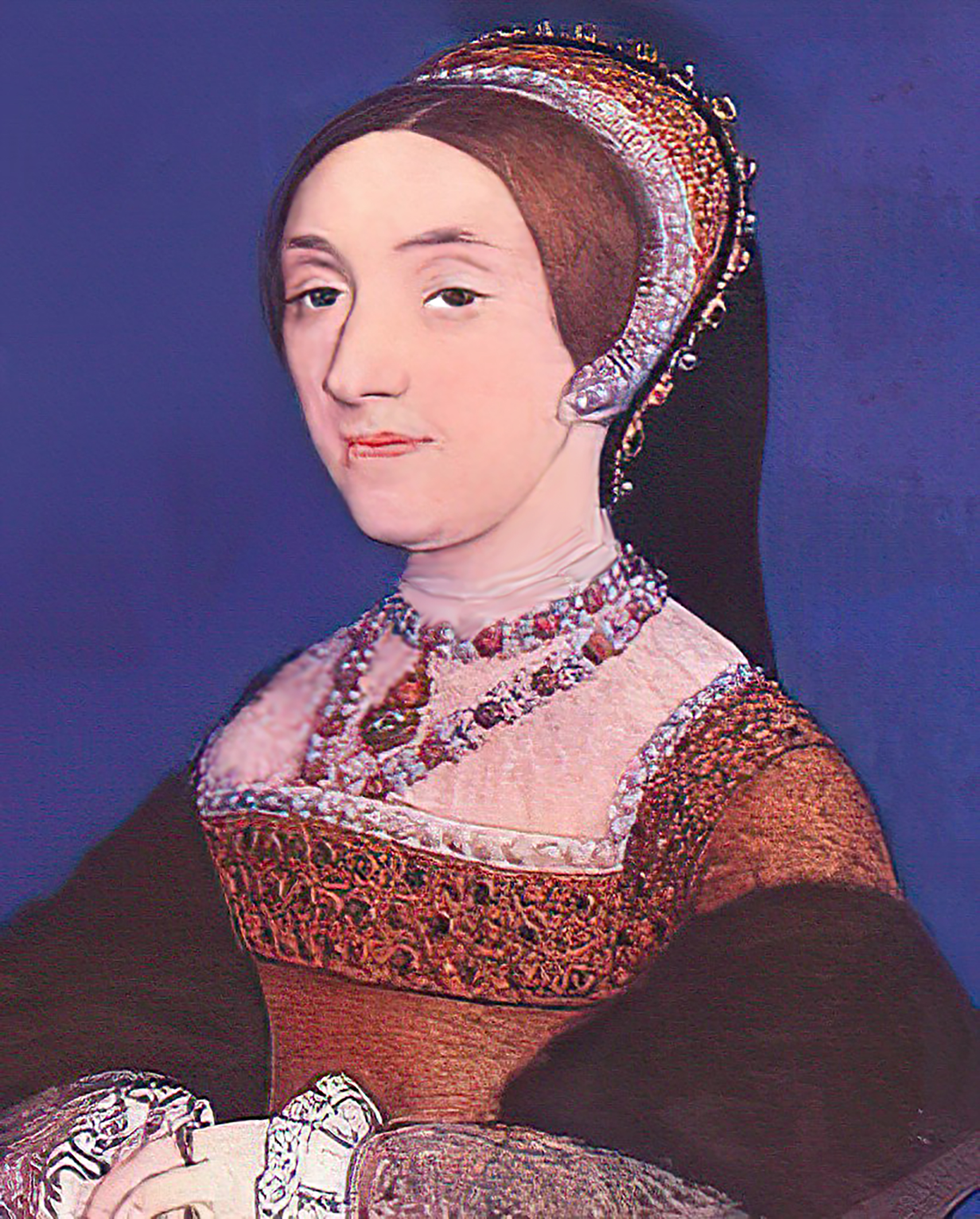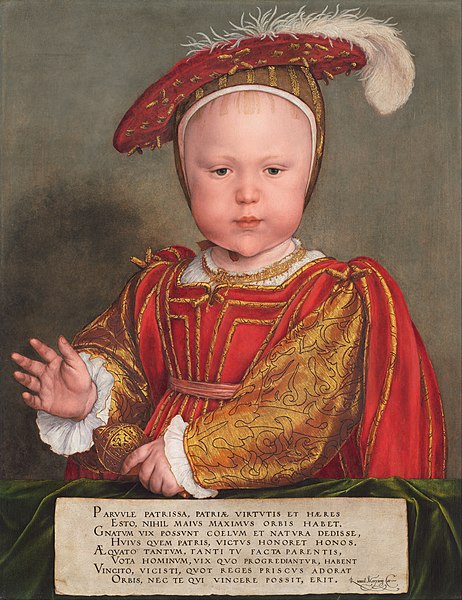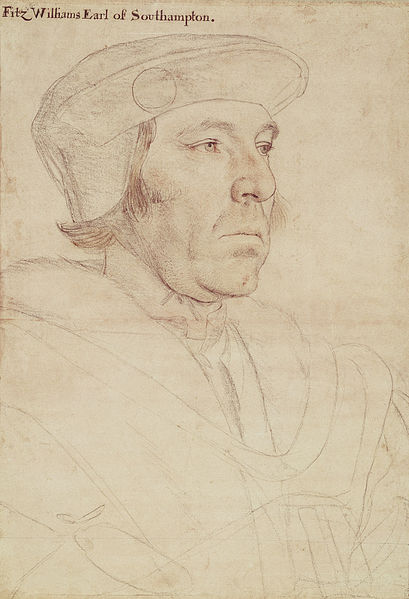 |
| Lady Rutland |
Trouble Afoot
In January
Arthur approached Dr Olisleger, who had escorted Anne to England, asking him if
Anne could take another of Arthur’s stepdaughter’s, Katherine Bassett, to join
her sister as one of the ladies of Anne’s Privy Chamber. Olisleger wrote in
reply that he had been informed by Cromwell that the posts had already been
filled by London.
Anne was
more than happy to assist Honor find places at court for her extended family[i]. Honor wrote to Lady Rutland[ii], one of the chosen few, in the hope
that she could recommend Katharine, who was already living in Lady Rutland’s
household. Lady Rutland replied that the king was the only person who had the
choosing of the queen’s ladies.
In February
1540, as part of his power play against Cromwell, Norfolk set up a commission[iii] in Calais to investigate
Arthur’s running of Calais, investigating the unrest plaguing the town, as well
as;
‘Matters of religion, as
touching the observations of the laws, statutes, and ordinances made for the
preservation surety and defences of the said Town.’[iv]
 |
| St George's Chapel |
Arthur was
allowed a seat on the commission, along with a number of lawyers, churchmen and
lords. The commission reported to London on 5th April, the verdict
supported Arthur and his party in the town.
On 17th
April 1540 Henry wrote to Arthur summonsing him back to London. Arthur happily
set out on the journey back to England, confident that he was about to be
raised to the rank of Earl. Once in London he attended the House of Lords.
Arthur then
travelled to Windsor Castle to take part in a chapter meeting of
the Knights of the Garter. Arthur and Sir Thomas Cheyney were appointed to assist the Earl of Cumberland installing the newly appointed
knights at a ceremony in St George’s Chapel. Arthur sat on the king’s left at
the ensuing Garter Knight’s feast where he was placed between the newly
ennobled Cromwell[v]
and Lord Russell.
The Botolf Conspiracy
 |
| Tower of London |
After this
Honor heard nothing more of Arthur apart from the fact that he was ill. On 17th
Arthur made a declaration of some sort, the content of which is not known. He
was then interrogated before Henry on the following day. Arthur was arrested at
10 o’clock on 19th May and bundled off to the Tower of London.
The problem
arose from a conspiracy emanating from within the Lisle household. One of
Arthur’s personal chaplains, Sir Gregory Botolf [vi]and two gentlemen
servitors, Clement Philpott, Edward Corbett along with a number of lesser
servants, were involved.
In January
1540 Arthur gave the three main conspirators permission to travel to England.
Catholic sympathisers all[vii], the conspirators were
involved in a plot to betray Calais to the French. Corbett and Philpott
travelled to England, but Botolf made his way to Rome. The main conspirators,
bar Botolf, were arrested on 1st May, this included men Cromwell had
insisted on favouring against Lisle’s advice.
‘That afternoon, in the
twilight Lord Sussex and the Council went to the Staple Inn where Lady Lisle
kept house. She….was put in prison in a room of the palace and the girls were
taken from her and put in prison in various places throughout the town. At this
time the Treasurer[ix]
took possession of all the treasure and clothes of Lord and Lady Lisle in the
King’s name.’[x]
Honor and
her family were viewed with suspicion, as a result of their friendships with a
number of noble French families. Two of the Bassett girls had been living in
French households and a marriage was being proposed for Mary with one Gabriel
de Montmorency, Seigneur de Bours; making the family even more
suspect.
Queen Number Five
 |
| Cardinal Pole |
To
strengthen his own position, rocky in the after effects of the failure of the
marriage to Anne of Cleves, Cromwell set about blackening Arthur’s name, making
much of a conspiracy that was pie in the sky in the first place. First Cromwell
had to separate Henry from his uncle, of whom he remained fond. To do so
Cromwell decided to tie Arthur in to his cousin Cardinal Pole[xi], and hoped to eventually
defeat his enemy Norfolk was now riding high.
Arrests were
made of the great and good. Richard Sampson, Bishop of Chichester was arrested shortly after Arthur,
then the king’s chaplain Dr Nicholas Wilson was detained; all three men were
accused of treason, having had communication with Rome. But Cromwell was on the
losing side and on 10th June he too was arrested, as he arrived to
chair a meeting of the Privy Chamber, on the charges of heresy and working
against the king’s purposes in religion. He turned to his fellow Privy
Councillors and told them;
‘I have never thought to
offend, but if this is to be my treatment, I renounce all claims to pardon and
ask only that the king should not make me languish long.’[xii]
His words
did not placate his fellow councillors, most of whom had long objected to the
upstart brewer’s son. Norfolk ripped off Cromwell’s garter star, finally
achieving his long held ambition to bring down his rival[xiii].
The Second Divorce
 |
| Catherine Howard |
The marriage
between Anne and Henry was not consummated, as Henry found himself impotent[xiv], and the architect of
the marriage suffered as well as the bride. Anne was put out to pasture on 24th
June having been given a
generous settlement, including Richmond Palace, and Hever Castle[xv]. On 10th July Anne agreed
to a divorce and wrote to her ‘brother’
Henry, signing herself as;
‘Your majesty’s most humble
sister and servant Anne.’[xvi]
Within days
of the announcement of the divorce Anne’s officers and servants were dismissed
and replaced anew with people she neither chose nor knew. One of the new ladies
was Katherine Bassett.
Cromwell had
been reluctant to facilitate the king’s divorce from Anne, knowing that to do
so would only open the way to Henry’s marriage to Norfolk’s niece. The dragging
of his heels in this matter only eased the way to Cromwell’s fall, much as
Wolsey’s failure in Henry’s first divorce led to his fall.
On 28th
July 1540, at the instigation of the Duke of Norfolk, Henry married Catherine Howard, one of Anne Boleyn’s cousins. The same day Cromwell
was beheaded at Tyburn, Henry practising his usual
disregard for the niceties. By then matters were already too late for Arthur to
take advantage of the turning tide.
Death of a Queen
Throughout
the summer of 1541 there were numerous executions of Catholics and conspiracies
were uncovered in Wales and the north of England. The 69 year old Countess of
Salisbury was executed in late May, Lord Leonard Grey died in July and all London expected
the king’s uncle to be one of the next to die; Arthur probably believed the
same. Henry was heard to say that Arthur had erred;
‘More through simplicity and
ignorance than through malice.’[xvii]
In July Arthur
was released from solitary confinement and was allowed to walk on the Tower
walls.
In November
1541 Catherine Howard was accused by Cranmer[xviii]. of adultery with one Thomas Culpepper, one of Henry’s favourite courtiers. She was examined
by members of the council led by Cranmer. Catherine was also accused of having
a sexual liaison with a Francis Dereham[xix] before marrying Henry. Her family,
who had been so eager for her to wed the king, hunkered down in the hope that
the flack would not hit them.
Rumours
abounded round the country and at one point Arthur’s stepdaughter Katherine
Bassett was brought before the Council. She and a friend, one Jane Ratsey, had
been overheard indiscreetly discussing the possibility that Anne of Cleves
might be considered for the position of queen again. Katherine asking if;
‘God is working His own work
to make the Lady Anne of Cleves queen again.’ Her friend, Jane Ratsey, had
replied that; ‘It was impossible that so sweet a queen as the Lady Anne could
be utterly put down’ and Mrs Bassett had exclaimed, ‘what a man the King is!
How many wives will he have?’[xx]
Both
Katherine and her friend were reprimanded for their loose tongues, although
they were not alone in their hopeful imaginings.
 |
| Thomas Wriothesley |
On 13th
February 1542 Catherine Howard, like her cousin before her, was beheaded for
adultery. Also executed alongside her was Lady Rochford[xxi]. By this time rumours were rife that
Arthur was to be freed; the rumours fired by the news that his arms had been
set up again in St George’s Chapel in Windsor Castle.
Henry sent
his secretary Thomas Wriothesley to Arthur to inform him that he was
to be released from the tower. Arthur appears to have had a heart attack and
died before he could leave his place of imprisonment;
‘The King sent him his Ring
from off his own Finger, with such comfortable Expressions, that he immoderately
receiving so great a pressure of Joy, his Heart was overcharged therewith, and
the Night following….he yielded up the Ghost.’[xxii]
Henry sent
orders for the release of Honor and her daughters who returned to England in
mid-March. Honor spent the last 24 years of her life in retirement in Cornwall.
Bibliography
The Lisle
Letters – Muriel St Clare Byrne, Penguin Books 1985
The Royal
Bastards of Medieval England – Chris Given-Wilson and Alice Curteis, Barnes and
Noble Inc. 1984
The Ebbs and
Flows of Fortune – David M Head, University of Georgia Press 2009
Thomas
Cromwell – Robert Hutchinson, Phoenix 2008
Henry VIII –
Robert Lacey, Weidenfeld & Nicholson and Book Club Associates 1972
The Earlier
Tudors – JD Mackie, Oxford University Press 1992
Anne of
Cleves – Elizabeth Norton, Amberley Publishing plc, 2010
Six Wives –
David Starkey, Chatto & Windus 2003
The Six
Wives of Henry VIII – Alison Weir, Pimlico 1992
www.en.wikipedia
[i]
Honor spent a lot of her time pursuing appointments for her daughters and
stepdaughters
[iii]
Part of a power play against Cromwell
[iv]
The Lisle Letters - Byrne
[vi]
A sweet talker, who known as ‘Gregory sweet-lips’ among his fellow servants and
was the bad sheep of a respectable Suffolk family
[vii]
As was Honor; rumour had Botolf as Honor’s lover
[viii]
Gruffyd worked for the deputy Governor Sir Robert Wingfield who had been at
odds with Arthur almost from the beginning
[ix]
Sir Edward Wotton
who was appointed to a post apparently revived in November 1540. The previous
post-holder’s remit ceased in 1528; so the seizure was either made by someone
other than the Treasurer or happened after November 1540
[x]
The Lisle Letters – Byrne
[xi]
Of whom Henry now harboured a pathological hatred
[xii]
Thomas Cromwell - Hutchinson
[xiii]
The Earl of Southampton replaced Cromwell as Lord Privy Seal
[xiv]
Naturally Henry blamed Anne for his inability to have an erection
[xv]
Former family home of the Boleyns
[xvi]
The Ebbs and Flows of Fortune - Head
[xvii]
The Lisle Letters – Byrne
[xviii]
An opponent of Norfolk’s; the two were at odds over religion as the Howards
held to the Catholic church
[xx]
The Six Wives of Henry VIII - Weir
[xxi]
Anne Boleyn’s sister-in-law, Lady Rochford had been promoting the liaison
between the young couple
[xxii]
The Lisle Letters - Byrne




